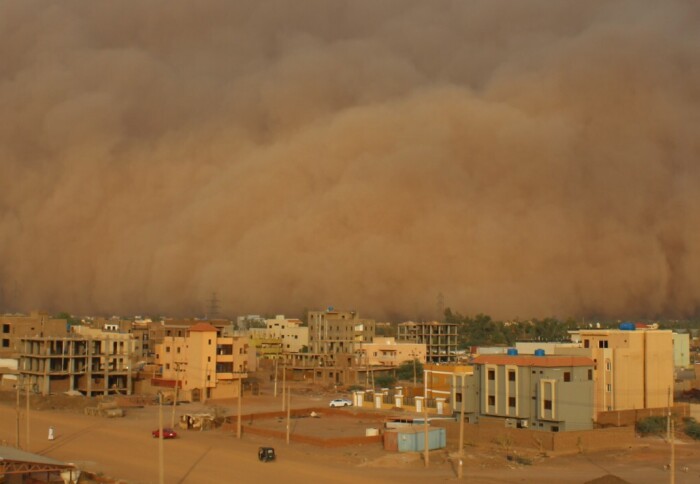Research prizes galore and sex differences in inflammation: News from Imperial

Desert dust sandstorm in Khartoum, Sudan
Here’s a batch of fresh news and announcements from across Imperial.
From research awards in environmental science and neutron physics, to comments on new research that hopes to understand why inflammation is different in men and women, here is some quick-read news from across Imperial.
Environmental research awards
Two research papers involving experts from Imperial’s Environmental Research Group (ERG) have received awards from scientific journals for the quality of their work this month.

Each year, the editors of Environmental Science & Technology (ES&T) review all published papers from the previous year to honour the most vital and influential work in the field.
A paper by Dr Julia Fussell, Dr David Green, Dr William Hicks, Professor Frank Kelly and Dr Ian Mudway was picked as a first joint runner up in the ‘Critical Review’ category for the ES&T’s Best Paper Awards for 2022. The paper reviewed the health impact of non-exhaust particles from road traffic and potential ways to mitigate this issue.
Separately, Dr Fussell, who is also a member of the World Health Organisation’s expert working group on desert dust, received an Editors’ Choice Award from GeoHealth for the best perspective or review paper of 2023. The paper reviewed the effects of desert dust and sandstorms on human health (pictured top).
Read more about the work of the Environmental Research Group.
Japanese physics collaborations
Dr Reza Mirfayzi has won an award from the Japan Applied Physics Society for his collaborative efforts in advancing laser-driven neutron sources (LDNS), including significant work undertaken at Imperial.
 LDNS can be used for various applications, including material testing and characterisation, neutron-based imaging, and cancer therapy, among others. The technology uses high-intensity lasers to accelerate ions or electrons and generate neutrons via nuclear reactions.
LDNS can be used for various applications, including material testing and characterisation, neutron-based imaging, and cancer therapy, among others. The technology uses high-intensity lasers to accelerate ions or electrons and generate neutrons via nuclear reactions.
One application of this Dr Mirfayzi worked on with Japanese partners is single-shot radiography, a technology that enables non-destructive material inspection. He also collaborated with Japanese partners to develop a compact, laser-driven cold neutron source. This proof-of-principle experiment paves the way for research and applications in the field.
Dr Mirfayzi, currently the diagnostic and data lead at Tokamak Energy Ltd, said: “It's truly rewarding to see our hard work acknowledged, especially after numerous applications we developed in the field.”
Read more about high power laser systems on Dr Mirfayzi's LinkedIn posts.
Sex differences in inflammation
The rates of inflammatory diseases are different in men and women, and scientists don’t yet know why. Inflammation is a normal process for the body to protect from injury or fight infection, however inflammation can get out of uncontrol in diseases like asthma and arthritis.
Dr Franz Puttur and Professor Clare Lloyd, from the National Heart and Lung Institute, discuss in Science recently published American-led research that found differences in the skin immune response in mice of different sexes.

Studying how sex hormones control immune responses in different organs is crucial to understanding why sex differences exist in responses to infection, inflammation, and treatment outcomes. Results from this research can help in the design of future sex-specific treatments for infection and inflammation.
Major funders now require that medical studies include both sexes, and the authors say it is vital that biological sex is considered in immunology study design. They also suggest it may be valuable to include transgender people taking sex hormones in studies to understand those hormones’ effects on the immune system.

Want to be kept up to date on news at Imperial? Sign up for our free quick-read daily e-newsletter, Imperial Today.
Article text (excluding photos or graphics) © Imperial College London.
Photos and graphics subject to third party copyright used with permission or © Imperial College London.
Reporter
Ms Helen Johnson
Communications Division
Hayley Dunning
Communications Division
Conrad Duncan
Communications Division
Samantha Rey
Communications Division